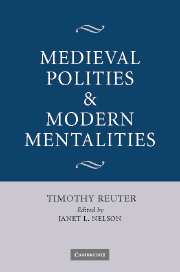Book contents
- Frontmatter
- Contents
- Editor's note
- Acknowledgements
- List of abbreviations
- Editor's introduction
- PART I MODERN MENTALITIES: HISTORIOGRAPHIES, METHODOLOGIES, PRECONCEPTIONS
- PART II THE SYMBOLIC LANGUAGE OF MEDIEVAL POLITICAL ACTION
- PART III POLITICAL STRUCTURES AND INTENTIONS
- 11 Assembly politics in western Europe from the eighth century to the twelfth
- 12 Sex, lies and oath-helpers: the trial of Queen Uota
- 13 Plunder and tribute in the Carolingian empire
- 14 The end of Carolingian military expansion
- 15 The Ottonians and Carolingian tradition
- 16 The making of England and Germany, 850–1050: points of comparison and difference
- 17 King, nobles, others: ‘base’ and ‘superstructure’ in the Ottonian period
- 18 The ‘imperial church system’ of the Ottonian and Salian rulers: a reconsideration
- 19 Peace-breaking, feud, rebellion, resistance: violence and peace in the politics of the Salian era
- 20 The medieval German Sonderweg? The empire and its rulers in the high Middle Ages
- 21 Mandate, privilege, court judgement: techniques of rulership in the age of Frederick Barbarossa
- 22 All quiet except on the Western Front? The emergence of pre-modern forms of statehood in the central Middle Ages
- Index
16 - The making of England and Germany, 850–1050: points of comparison and difference
Published online by Cambridge University Press: 12 August 2009
- Frontmatter
- Contents
- Editor's note
- Acknowledgements
- List of abbreviations
- Editor's introduction
- PART I MODERN MENTALITIES: HISTORIOGRAPHIES, METHODOLOGIES, PRECONCEPTIONS
- PART II THE SYMBOLIC LANGUAGE OF MEDIEVAL POLITICAL ACTION
- PART III POLITICAL STRUCTURES AND INTENTIONS
- 11 Assembly politics in western Europe from the eighth century to the twelfth
- 12 Sex, lies and oath-helpers: the trial of Queen Uota
- 13 Plunder and tribute in the Carolingian empire
- 14 The end of Carolingian military expansion
- 15 The Ottonians and Carolingian tradition
- 16 The making of England and Germany, 850–1050: points of comparison and difference
- 17 King, nobles, others: ‘base’ and ‘superstructure’ in the Ottonian period
- 18 The ‘imperial church system’ of the Ottonian and Salian rulers: a reconsideration
- 19 Peace-breaking, feud, rebellion, resistance: violence and peace in the politics of the Salian era
- 20 The medieval German Sonderweg? The empire and its rulers in the high Middle Ages
- 21 Mandate, privilege, court judgement: techniques of rulership in the age of Frederick Barbarossa
- 22 All quiet except on the Western Front? The emergence of pre-modern forms of statehood in the central Middle Ages
- Index
Summary
The post-Carolingian era is by common consent the period in which the recognisable ancestors of modern European nation-states were formed, and yet the processes of formation were very varied ones. We may set out the issues which this chapter seeks to address in three quotations from Karl Leyser:
Anglo-Saxon England in the tenth century presents more similarities with the world of the Reich than at any other time of their respective histories. It had a regnal structure with a partially ethnic basis, and it knew the predominance or at least hegemony of one kingdom, Wessex and its society, over all the others, largely because it gave them their kings. The continental Saxons enjoyed similar advantages thanks to the east Frankish kingship of their leading family, the Liudolfings. The rulers of Wessex in the tenth century acquired an imperium which did not so much imitate the Ottonians as develop like forms of overlordship even ahead of them.
The second is Leyser's anticipatory summary of much of the work of scholars such as Campbell and Wormald, with whom he was in close contact:
We tend to think that centralisation, bureaucracy, too much government and taxation are very recent troubles in our polity, quite novel English diseases, contrary to the mainstream of all the best historical traditions. The reverse is true. They are deep-seated and deeply rooted phenomena in English political society, part of its very birth.
The third is found in a discussion of Ottonian government:
The older school [of constitutional historians of medieval Germany] assumed … the state and a volume of government without asking very precise questions of how it worked from day to day. […]
- Type
- Chapter
- Information
- Medieval Polities and Modern Mentalities , pp. 284 - 299Publisher: Cambridge University PressPrint publication year: 2006
- 1
- Cited by

